Rice paddies cascade down volcanic mountains like green lava fields. Terraced land is so ubiquitous it looks as though formed from nature in this self-proclaimed island of the Gods. Workers toil the land in methods almost unchanged in centuries as they follow in the spiritual, cultural and environmental harmony of the subak. A manifestation of a belief that combines all facets of life into one, and a river runs through it.
Bali, Indonesia. A mecca for surfers, partying tourists, supple yoga gurus and curious scuba divers. The gentrified party towns like Kuta and Seminyak stretch up a seemingly endless strip of sand from Ngurah Rai airport to Canggu. Denpasar’s traffic choked streets remain at a standstill most the day and the relentless shouts from touts offering cheap watches, massages and taxis follow persistently in the tourists wake.
Yet, head a little out of town and up into the hills and you will soon encounter the rice paddies. Some are tourist destinations in their own right as the aesthetic green rows of rice make an attractive Instagram selfie in the setting sun. Though wading a little deeper into the inner workings of the rice paddy and I soon uncovered a complex system at work. A system that has lasted for centuries and is connected to an entire cultural phenomenon that combines engineering, a belief system and a communal way of life.
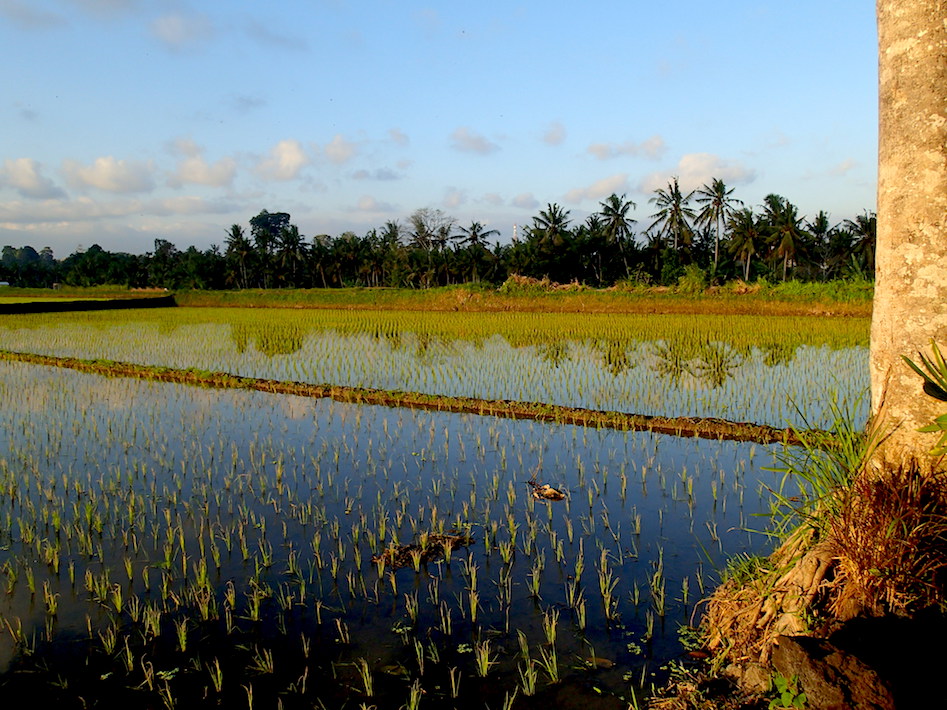
Overlooking the rice paddy from villas around Bali are very attractive to tourism.
I was in Bali on a hiatus of sorts, unshackling the comfy confines of a corporate city life and eventually found myself overlooking a rice paddy from the deck of our well-appointed villa. It was a selling point of many villas yet I couldn’t help but think they encroached on the rice paddy just a little. I did however get to understand the ebb and flow of the life on the rice paddy which led me to do a little digging into how the whole system works. It gave me a realisation that in pursuit of my own happiness I may in fact be preventing a similar pursuit of that, the Balinese rice farmer.
It all starts with the fundamental belief of Tri Hita Karana, the cornerstone of Balinese beliefs. In its simplest terms, Tri Hita Karana means ‘the three parts of happiness’. That being a connection to the environment, a connection to the spirit and a connection to your fellow humans. The three parts to this belief is mirrored in the operation of the system that is used to manage the rice paddies, known as the ‘subak’. The practice of the subak has been in existence for over a thousand years and is still one of the most effective and sustainable systems for growing rice in the world.
Environmentally, the traditional subak is a poster-child in sustainability. The water supply begins in the mountains beginning at Lake Bakur flowing through the hills and feeding each Subak on its way to down to the sea. Management of these waterways is vital for the entire system to work. For instance, by retaining water too long in an upper field would be detrimental to downstream fields. However, should these lower fields dry up, pests would increase and eventually infect all the fields. So, there is strong interdependence on rice farming to keeping the water flowing at a regulated rate.
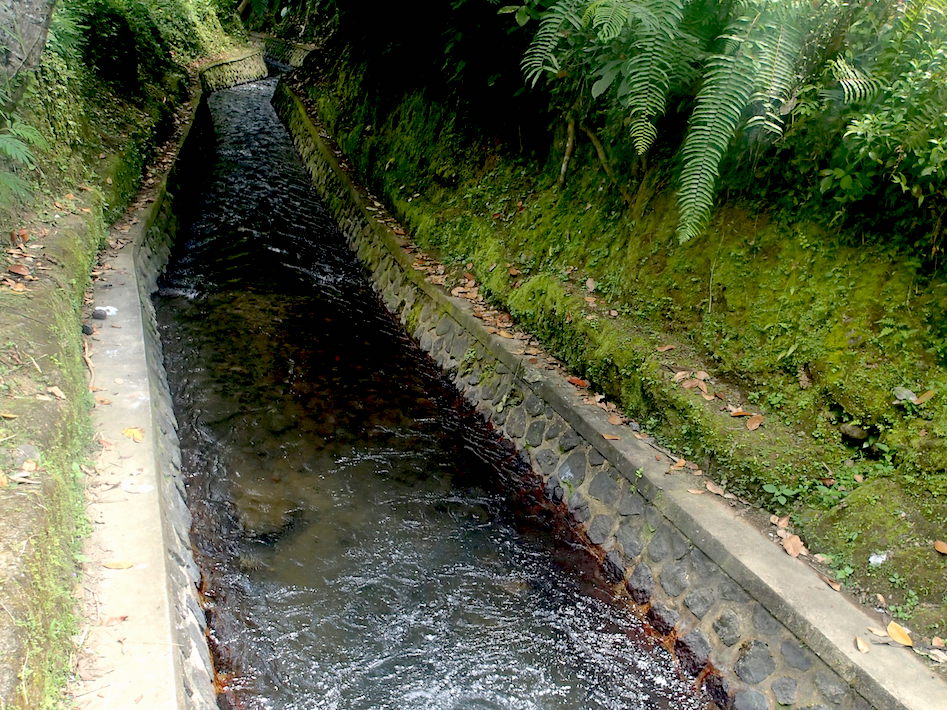
Subak irrigation channels run water all across Bali passing through temples to ensure a prosperous crop.
Spiritually, rice is seen as a gift from Dewi Sri, the Goddess of fertility and productivity. Temples are constructed at key junction points in the irrigation system to ensure a sustained water flow and a blessing for a bountiful harvest. Daily ceremonies are held in these temples to give thanks so the water and rice will continue to flow and grow, respectively. The temples also act as formal meeting points for discussing key issues on the subak.
Socially, the organisational structure of the subak system is extremely democratic. While a family may own production of rice from their respective rice paddy, the decisions on what rice to grow when to harvest and so forth are made collectively. Each person has an equal say as decisions made impact the overall sustainable system. It is unheard of for anyone to break these rules for personal gain at the risk of complete social exclusion.
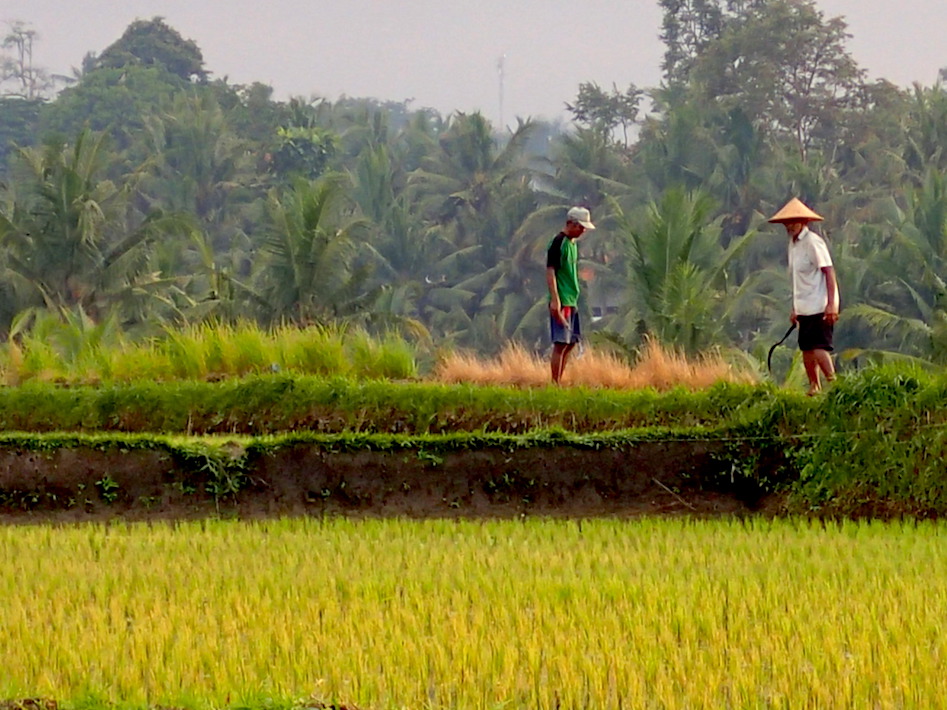
Subak workers all have designated roles but have an equal say in decisions affecting the subak.
This harmonious relationship between the environment, spirit and fellow man earned the subak a UNESCO Cultural Heritage badge in 2012. This distinction is both a blessing and a curse. The increased desirability of the rice paddy as a tourist attraction turns a humble rice farmer into a potential property developer. Tourism to Bali has seen consistent growth of late, with a persistent 15% growth rate year on year, it is reaching breaking point.
The more portions of rice paddies converted to hotels and apartments not only puts the real estate for rice growing at risk but also the availability of water and water purity. This symbiotic relationship towards a culturally defined pursuit of well-being and happiness begins to fall apart. Every where you turn in Ubud for example there is some type of construction going on, usually on flat farming land which was once occupied with rice.
Rice farming is hard work and selling out, so to speak, is an easy way to a perceived better life. It’s easy for me to sit back and critique from afar that this traditional, ingenious and ultimately successful way of farming must remain. I felt a real sense of guilt sitting back in my villa while my very presence alongside the rice paddy may be impacting the livelihood of the villagers I see toiling in the midday sun each and every day. Attempts to lend a hand quickly led to me realising I would do more harm than good! So, I took a look what options are available for tourism and agriculture to co-exist in Bali.
Barn n Bunk
At a local Pecha Kucha presentation in Ubud I got to hear from Lili Tilarsih who runs Barn n Bunk, an Eco-Hostel located near the beach in Masceti. Barn n Bunk is designed to create a sustainable method of tourism alongside the subak. It aims to educate travellers on the ways of organic farming and also allow rice farmers to earn a share of the tourism dollar.
As Lili says herself; “I believed that this place is a sanctuary for people to come and learn not only about farming but also cultural exchange. The idea is to have a win-win solutions for mass tourism and preserving Balinese farming land. All about balance between the nature, human, and God.”
Barn n Bunk has also identified the growing generational gap of agriculture becoming a less esteemed vocation than it once was. So Barn n Bunk also aims to teach Balinese youth new sustainable ways of tourism and agriculture. Barn n Bunk also aims to reduce the increased use of pesticides by educating farmers on a proven organic method to increase crop yields.
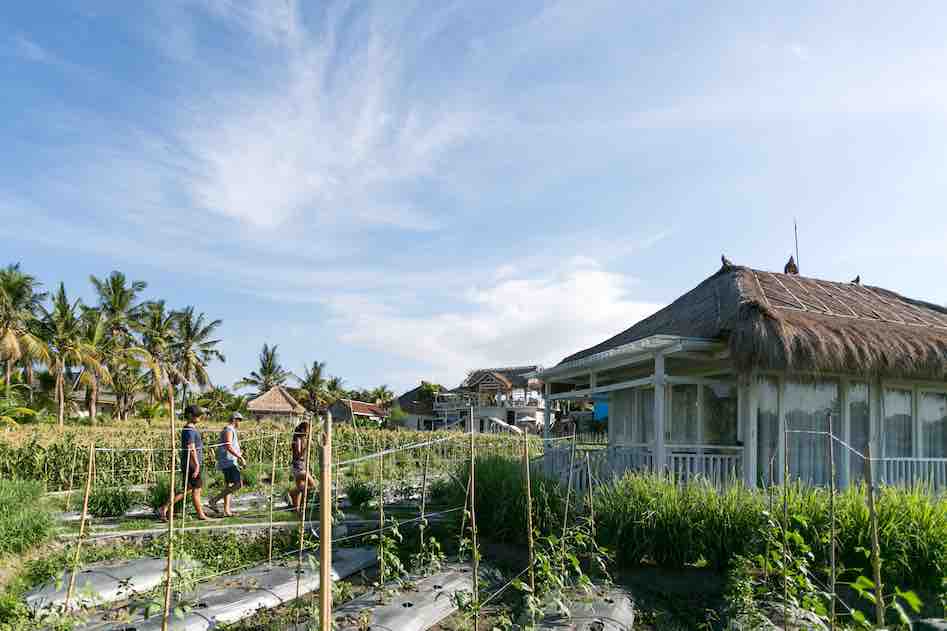
Barn n Bunk Eco Resort offers a way for local farmers to benefit from tourism but also retain operation their farms.
The recent volcanic rumblings from Mt Agung has created headlines around the world. While this may have an immediate and potentially catastrophic impact on life in Bali, I fear the less reported story of diminishing subaks may have a longer, ever-lasting impact to a self-sustaining system of food production that has lasted for over one thousand years.
I recently witnessed a cremation ceremony in the local village. Hindu tradition states that 12 days after the cremation the ashes are given to the family in a coconut shell before being released into a nearby river or sea to return the remains back to the elements. Indeed, eventually all things do merge into one and, in Bali, a river certainly runs through it all. And I hope that river continues to flow freely through the subak system for many years to come.
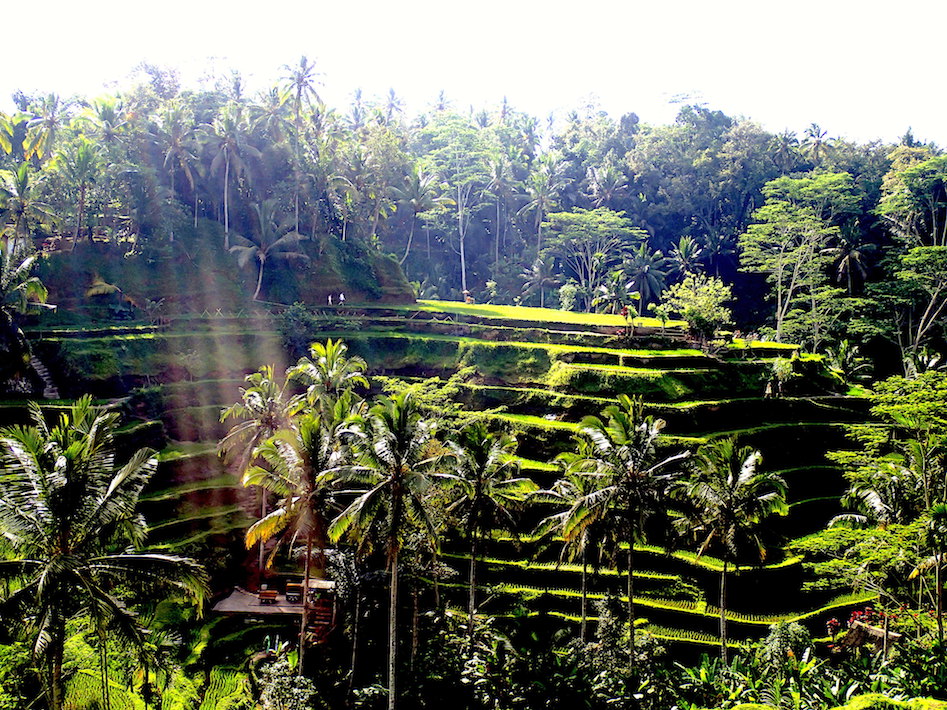












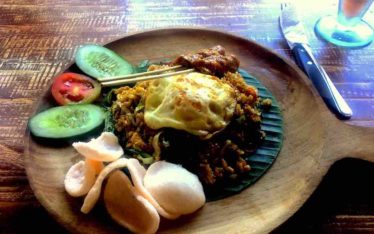
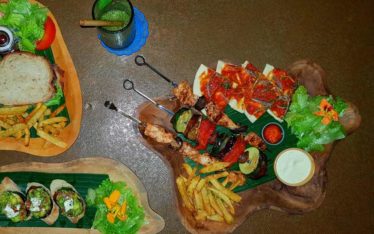
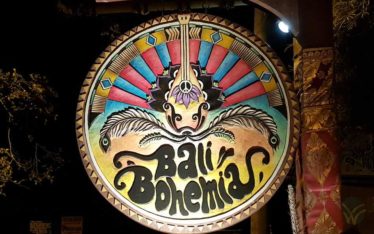
About The Author
Warren
Ever since venturing out the back gate into the bush as a kid, I've had a curiosity to escape and explore as often as I could. It's fair to say that my curiosity has continued to grow instead of fade as the years go on. It eventually came time to turn a few scribbled notes into some legible stories and travel tips for anyone with a similar curiosity as me.